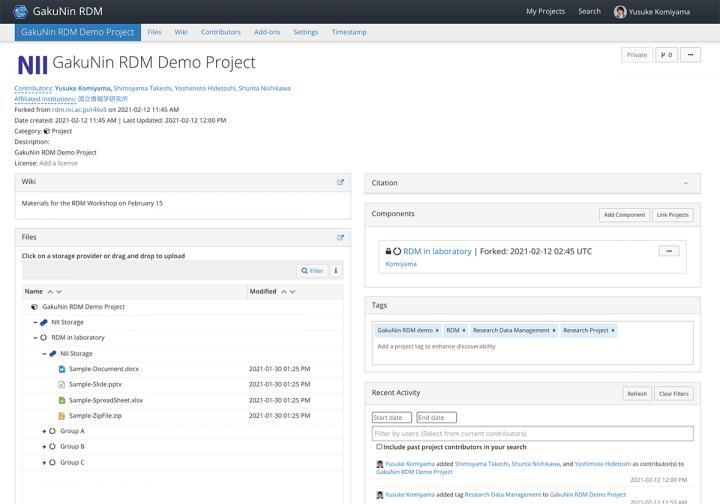to support management/sharing of research data among Japanese academic institutions nationwide

Credit: © National Institute of Informatics
NII developed GakuNin RDM in response to the Japanese government’s policy on science and technology, as well as the international trend toward open science. The GakuNin RDM service supports researchers’ data management, from daily research activities in the laboratory to publicly funded research projects. In addition to enabling collaborators to manage and share data across organizations, the service can also be linked with various cloud services and research software.
From another perspective, GakuNin RDM is expected to suppress operations that lead to research misconduct owing to a trail management function to record the operation history of research data saved in the system. By preventing research misconduct before research results are published, and by serving as a starting point for research data to be properly published and discovered, GakuNin RDM can support the future development of open science.
GakuNin RDM
https:/
In recent years, the importance of data has been increasing in industries as well as in academic fields. The proper management of research data is important for effectively conducting research projects and increasing the transparency of the processes through which results are obtained. Moreover, in today’s academic research, which has become highly complex, researchers are required to conduct interdisciplinary research and industry-academia collaborative research with speed and efficiency. As shown by the fact that Japan’s science and technology policy (Cabinet of Japan Integrated Innovation Strategy 2020 *2) includes goals such as “promotion of advanced data management, including the use of research data generated by publicly funded research activities,” the need for a nationwide research data platform has begun to increase.
To meet these new academic demands, since April 2017, the National Institute of Informatics (NII) has been building a new service called GakuNin RDM to support research data management. Necessary functions have been continually expanded in the demonstration experiments that began in January 2019, and GakuNin RDM’s full-scale operation for universities and research institutes began on February 15th, 2021.
For more information about this service, please refer to the Information on application for use page.
Information on application for use
https:/
GakuNin RDM enables research data to be quickly managed and shared by multiple researchers across organizations. Thus, in addition to being used for individual research activities, it can serve as a hub for joint research, and used flexibly for research projects of various sizes and fields. Moreover, it is highly scalable and can be linked with cloud storage and external tools that are often used by researchers. GakuNin RDM also partakes in the Academic Access Management Federation in Japan (GakuNin)*3, and allows users to log in to the same environment as usual and use the service even while teleworking or during business trips.
GakuNin RDM features a trail management function that uses time stamps from a third-party time authentication authority, allowing one to prove that the data stored in a system existed at a particular time. This is also a powerful function from the perspective of research integrity. For academic institutions, centralized management of research data on a common infrastructure system can be expected to enhance the data governance of academic institutions. Institutions with GakuNin membership can easily introduce the service to their organization by applying for use and linking access management systems.
Figure 1 shows an example of multiple research groups using GakuNin RDM for research data management and sharing. GakuNin RDM also allows principal investigators to manage the projects conducted by different groups in a list form.
###
About the Research Organization of Information and Systems (ROIS)
ROIS is a parent organization of four national institutes (National Institute of Polar Research, National Institute of Informatics, the Institute of Statistical Mathematics and National Institute of Genetics) and the Joint Support-Center for Data Science Research. It is ROIS’s mission to promote integrated, cutting-edge research that goes beyond the barriers of these institutions, in addition to facilitating their research activities, as members of inter-university research institutes.
About the National Institute of Informatics (NII)
NII is Japan’s only academic research institute dedicated to the new discipline of informatics. Its mission is to “create future value” in informatics. NII conducts both long-term basic research and practical research aimed at solving social problems in a wide range of informatics research fields, from fundamental theories to the latest topics, such as artificial intelligence, big data, the Internet of Things, and information security.
As an inter-university research institute, NII builds and operates academic information infrastructure essential for the research and educational activities of the entire academic community (including the Science Information Network) as well as developing services such as those that enable the provision of academic content and service platforms.
https:/
(*1) Research Center for Open Science and Data Platform: In response to the global momentum toward open science, this research center was established within NII in April 2017, in order to develop and operate an academic platform that could serve as an infrastructure for open science. It is expected that, through the wide sharing of academic papers and research data in academia and society, and a wide range of research activities being carried out openly, research activities will be accelerated, problem solving based on close cooperation with society will be promoted, and that this will push academic activities to a new dimension (open science).
See https:/
(*2) Cabinet of Japan Integrated Innovation Strategy 2020:
https:/
(*3) Academic Access Management Federation in Japan (GakuNin): The Academic Access Management Federation in Japan is a federation consisting of universities that use academic e-resources and the institutions, publishers, etc., that provide these e-resources. By trusting the policies of the federation, institutions are able to realize mutual cooperation with regard to access management.
See https:/
Media Contact
Takuji Sekine
[email protected]
Original Source
https:/




